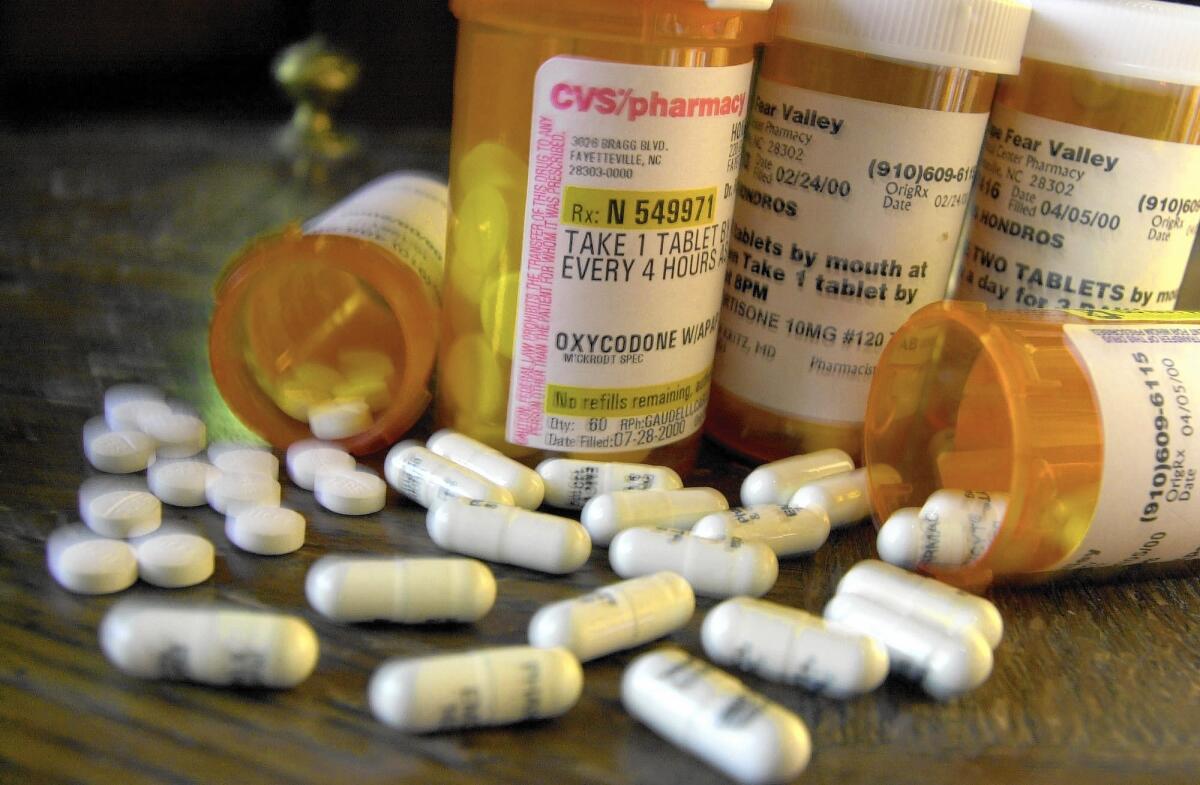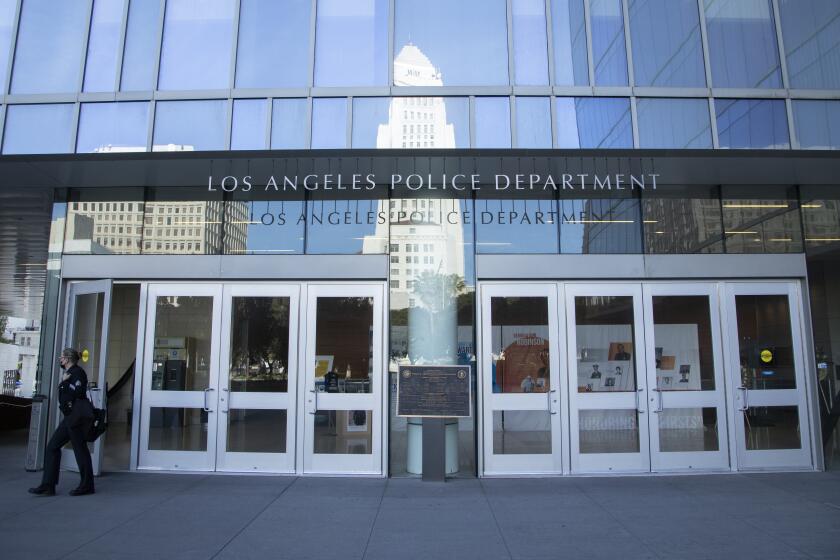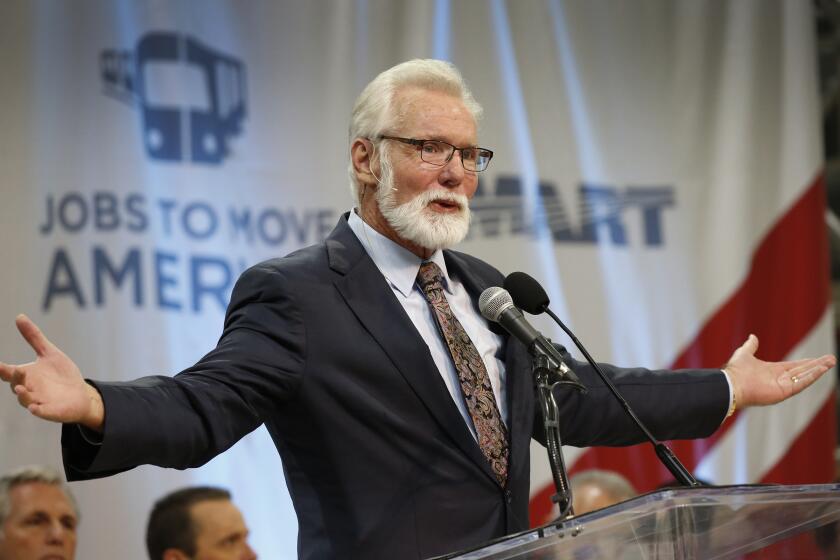Pharmaceutical industry is lobbying hard against an L.A. County drug take-back proposal

- Share via
Venice resident Carol Royce-Wilder received a call a few weeks ago about a proposed program in Los Angeles County that would set up a network of sites where unused medication could be dropped off for disposal.
It’s a topic in which Royce-Wilder, 74, is interested. She said she worries about the proper way to dispose of prescription drugs.
“The guy starts giving me this pitch that it’s going to cost a huge amount of taxpayer money if the bill passes,” she said. “I assumed from what he said that he was with a consumer organization.”
NEWSLETTER: Get essential California headlines delivered daily >>
He asked if she would be willing to send a letter to her county supervisor, Sheila Kuehl, opposing the proposal. She agreed.
The pre-written letter arrived a few days later. Before sending it to Kuehl, Royce-Wilder decided to research the organization behind it.
She was surprised to find that the group, Consumer Healthcare Products Assn., was an industry lobbying group representing over-the-counter drug manufacturers. She said she felt “bamboozled.”
County officials have gotten a lot of those letters. Drug manufacturers have mounted a vigorous lobbying campaign against the county proposal, which would require pharmaceutical companies to finance a disposal program for unused medications and syringes.
Proponents say the program would reduce chemicals ending up in the water supply, and would help curb prescription drug abuse by making sure that unused drugs are safely disposed of rather than stockpiled in medicine cabinets.
The opponents say it would be costly and have little effect on the problem. They argue that the better solution would be to educate consumers about how to properly dispose of their unused medications, which they argue would be in the trash in a sealed plastic bag.
Drug take-back programs are common outside the United States but are only beginning to gain traction here. A handful of California counties have adopted ordinances like the one L.A. County is considering. The first one, adopted by Alameda County in 2012, was held up in court until May 2015, when the U.S. Supreme Court declined to hear an industry challenge to the law.
Soon after, L.A. County supervisors voted to explore their own prescription drug take-back program, which would also include over-the-counter drugs and syringes. The county has about 20 collection sites run by the Sheriff’s Department, and some pharmacies have voluntary take-back programs. Once collected, the drugs are incinerated.
But officials said there aren’t enough available sites for the county’s 10 million residents. They want the pharmaceutical industry to finance the creation of a larger network.
In the second half of 2015, pharmaceutical industry groups spent nearly $250,000 lobbying the county, according to disclosure filings. Supervisors’ offices received dozens of letters and phone calls from consumers worried that the measure would push up the cost of their medication.
“This is a much more concentrated level of lobbying than I usually see in the county, and I think it’s because there’s a national issue at stake here,” said Kuehl, who said she favors a drug take-back ordinance. “From what I can tell, they’re spending more on lobbying than they ever would on a take-back program.”
It’s unclear how much the program would actually cost, as it would be up to the drug manufacturers to design it. Drop-off sites could be at pharmacies or other locations, and measures could include allowing consumers to mail in their unused drugs.
In Alameda County, the program still has not been fully implemented but was projected to cost between $330,000 a year — the county’s estimate — and $1.2 million — the drug companies’. Pharmaceutical companies collect $950 million a year in sales revenue there.
A spokesman for the Consumer Healthcare Products Assn. said in a statement that the county proposal would create “an expensive, inefficient, unworkable and ineffective program that would garner low levels of participation and do little to accomplish the goals the county is seeking to resolve.”
Instead, the group wants the county to collaborate on a public education campaign.
“L.A. County is important to us because it presents an immense opportunity to advance a public-private partnership that effectively deals with the issue of safe medicine disposal,” the statement said.
Other industry groups, including Pharmaceutical Research and Manufacturers of America, sent letters taking a similar position.
On the other side, the take-back program is supported by environmental, waste management and consumer protection groups and by many of the county’s smaller cities. The city of Los Angeles has yet to take a position on it. Individual cities would have to opt in to the county’s program, which would initially cover only unincorporated areas.
The proposal had been expected to come to the Board of Supervisors for a vote Tuesday, but at the request of Supervisor Michael D. Antonovich — who initially proposed the program — the board agreed last week to postpone it until May 3.
Antonovich wrote that the county had received “numerous calls and inquiries about the implementation of such a program, necessitating further review.”
His health deputy, Fred Leaf, said the supervisor still wants to find ways to reduce the volume of drugs that find their way into the water supply. But he said they wanted more time to understand the legal requirements and address the issues raised by the industry groups.
“It’s really complicated and we want to make sure that we have a program that really can be rolled out and works,” he said.
Twitter: @sewella
ALSO
Changes could add hundreds of millions of dollars to first 29 miles of bullet train
‘It’s not supposed to be this way’: Why it’s getting more difficult for foster families
News of a minimum wage hike deal in California is met with relief -- and anxious arithmetic
More to Read
Sign up for Essential California
The most important California stories and recommendations in your inbox every morning.
You may occasionally receive promotional content from the Los Angeles Times.











